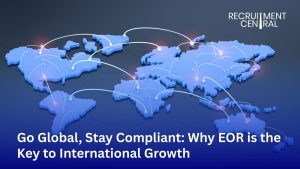With our blog “Remote Work Singapore: Empower Your Work-Life Balance” you can truly unleash your career growth. So let me ask you, have you ever craved the freedom to ditch the daily commute to your work and work from anywhere? The world of work is changing, and Singapore is witnessing a revolutionary change in its work culture. A 2022 survey by the Ministry of Manpower (MOM) revealed that 71% of employed residents worked from home at least once a month, highlighting a strong employee preference for remote work arrangements. More than 7 in 10 Singaporeans prefer remote work, higher than global average: IMF economists | The Straits Times.
In this blog, we’ll delve into the benefits of remote work, from increased flexibility to a better work-life balance, and it will also shed light on the culture of remote work in Singapore.
Remote Work Singapore: What does working remotely mean?
Remote work can be defined as a work style where employees complete their assigned tasks outside of a traditional work setting. When we think of remote work, the idea of working from home instantly pops up, but it does not always mean that. Remote work could also mean working in a co-working space, in a coffee shop, or from one’s home office.
Remote work Singapore: How do you benefit from it?
This blog section will delve into the many benefits of working remotely.
1. Increase in Productivity
Embracing the culture of flexible working, aka remote work in Singapore, has increased productivity in many business sectors. Remote work eliminates hours spent commuting and other distractions, such as office politics, allowing for efficient time management. Flexibility allows employees to be productive at their peak hours, be it early morning or late at night, hence maximizing output.
2. Work-life Balance
An individual working in a flexible work arrangement can easily integrate their work life with their personal life. For example, if a person has a small child or has duties like taking care of older people in their family, they can attend to their individual needs without compromising their work commitments. It leads to less stress and better performance.
3. Reduced Cost
Employers and employees can both experience significant cost savings. Employees can save money on commuting daily, costs associated with work-hour meals, and costs per se, while employers can reduce the overhead costs of paying office rent, utilities, and supplies.
Remote Work Policy in Singapore
It is to be noted that even though work flexibility is not a statutory right in Singapore, the government has been implementing guidelines to make the workforce more flexible and empower a good work-life balance. Any right to flexible work arrangements must mutually be agreed on between the employer and the employee. The Tripartite Advisory has set out guidelines for flexible work arrangements. While the advisory does not work with force, employers in Singapore must observe and comply with it to reinforce productivity with less stress. Here are some guidelines that an employee must follow when requesting flexibility and should do so in writing and address the following pointers:
- Type of scheduled work and location.
- Suppose the proposal is temporary. Start and end date of the agreement should be stated.
- How will the employer connect with the employee, what is the expectation regarding responsiveness to the team, and how will the employee continue to deliver their work?
- Alternative arrangements in case the proposal is not feasible or suitable.
- Safety and Suitability about the alternative work location.
When reviewing these guidelines, the employer should be fair and objective while evaluating the request and must communicate the decision promptly within 21 days. If there is a decline, it is encouraged to document it, inform the employee of the reasons for the rejection, and discuss with them the possible alternatives.
CONCLUSION
The future of work in Singapore is undoubtedly remote-friendly. With its world-class infrastructure, government initiatives supporting remote work, and a growing cultural acceptance of flexible work arrangements, Singapore stands poised to be a leader in the remote work revolution. Additionally, remote work in Singapore allows individuals to design their work environment for optimal focus and well-being, potentially leading to increased productivity and job satisfaction.
Embrace the flexibility and potential of remote work in Singapore, and start exploring your options today with recruitment central today.







